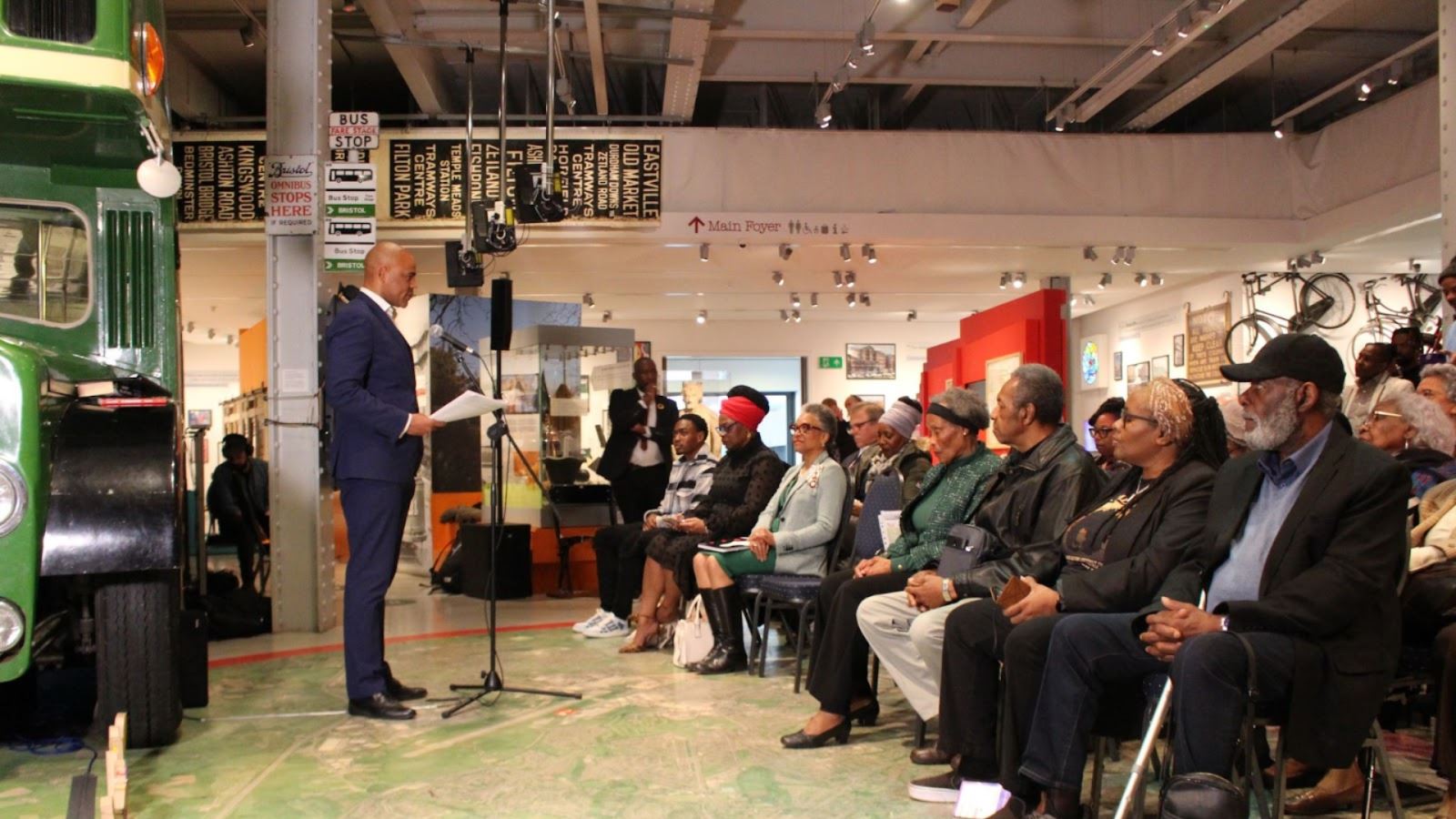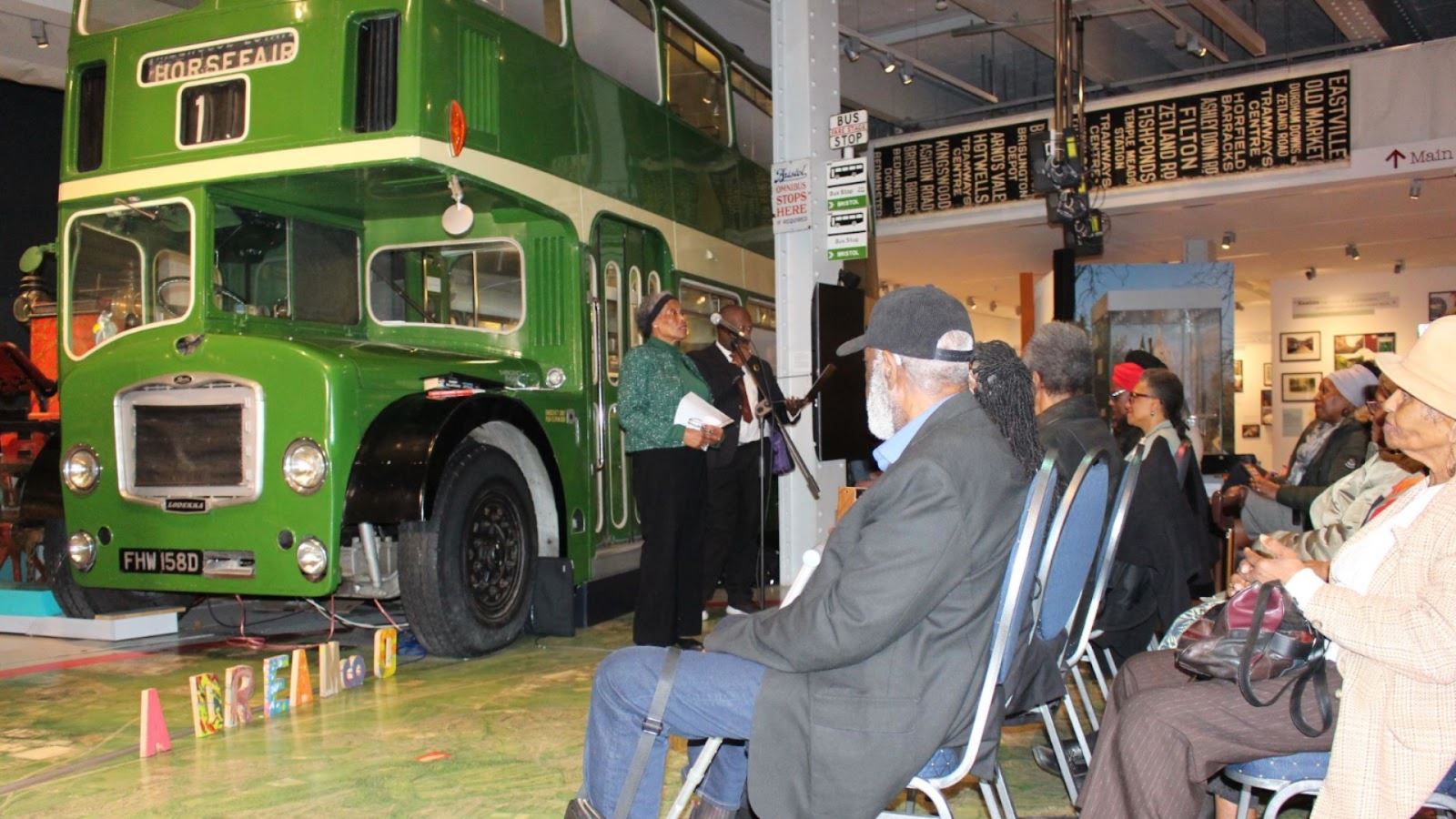Community representatives from across Bristol met at M Shed on Friday (28 April) to mark the 60th anniversary of the beginning of the Bristol Bus Boycott. The event included a speech by Mayor Marvin Rees, a performance by former city poet Miles Chambers and the launch of a public competition to decorate a Bristol bus with artwork that honours the boycott and its legacy.

First West of England is looking for someone to design a brand new bus livery to mark the 60th anniversary of the 1963 Bristol Bus Boycott and bring to life this important moment of social action and the legacies of those involved.
The bus design competition is part of the ‘Drive for Change’ campaign from First West of England, who have teamed up with Bristol Ideas, Creative Connex and Curiosity UnLtd to commemorate this momentous anniversary. The competition winner will see their artwork transform one of First West of England’s Bristol buses, as well as receiving a year’s bus travel with First West of England, a prize worth £1,050. The design must be eye-catching, bold and clearly commemorate the 1963 Bristol Bus Boycott.
The deadline for entry forms and artwork is Friday 9 June. Entries must be sent to bristolmarketing@firstbus.co.uk, and designs drawn by hand, digital photography and designs made on a computer will all be accepted. The winner will then be notified on Monday 19 June, with the bus wrap unveiled at a special launch event on Monday 28 August. The winning design will remain on the vehicle for at least 12 months from the launch date. For full details of the competition, visit firstbus.co.uk/driveforchange.
From Monday 1 May, First West of England’s passengers across the region will be able to hear audio clips telling the story of the Boycott while on board the buses.
Doug Claringbold, Managing Director of First West of England, says: ‘Many aspire to change the world for the better, but few have had the enormous impact achieved by those who started their protest 60 years ago. Today we start a programme of events designed to celebrate and commemorate the action that they took and the results that they achieved. As well as looking back, we must continue to look forward, drive positive change and take inspiration from those who successfully campaigned for a fairer, more inclusive society.’
Marvin Rees, Mayor of Bristol, says: ‘The men and women who led the Bristol Bus Boycott brought protest to our streets and legislation to the statute book. People like Asher and I have been able to walk through the doors that they opened for people of colour. We are truly standing on the shoulders of giants, and I thank all of the organisers of this event for giving us the opportunity to thank and celebrate them once again ahead of the 60th anniversary of the start of the Boycott.
‘People like Barbara Dettering are both personal and political role models across Bristol. That was true for me when I was a kid playing at Bristol West Indies, the cricket club that Guy Reid-Bailey co-founded, and both before and after the 2012 mayoral elections, when Paul Stephenson was a real support for me. It was also clear at a recent primary school visit in Whitchurch, where pupils spoke to me about our city’s civil rights leaders with reverence for the lasting change that the Bristol Bus Boycott achieved.'

In the 1960s, Bristol’s bus services were operated by Bristol Joint Services, owned by the Corporation of Bristol and the privately owned Bristol Omnibus Company, whose workers belonged to the Transport and General Workers’ Union. In 1955, the local branch of the union had passed a resolution to ban Black or Asian people from working as bus conductors and drivers. This policy was exposed by the Bristol Evening Post in 1961 and a campaigning group emerged to oppose the discrimination, bringing the policy to public attention.
Inspired by the events of the 1955 Montgomery bus boycott in which Rosa Parks and other community activists refused to give up their seats, a boycott of Bristol’s entire bus network began on 30 April 1963 and it lasted for four months. It ended in August 1963 when the Bristol Omnibus Company was finally forced to end its ‘colour bar’. The campaign helped pave the way for the UK’s Race Relations Acts of 1965 and 1968.
‘The 1963 Bristol Bus Boycott was a landmark event for British civil and legal rights. Campaigners vexed from signs that read “No Irish, No Blacks, No Dogs,” fought for racial equality and social justice. Their protests led to the end of ‘the colour bar’ which banned Black and Asian people from driving buses,’ says Roger Griffith, Bristol-based writer, activist and UWE lecturer. ‘These actions would pave the way for Britain’s Race Equality Acts and ultimately impacted several British Equality laws. The Equality Act 2010 protects the rights of equalities groups across race, sex, religion, gender, marriage, pregnancy, age, disability and LGBTQ+ rights. This competition offers an opportunity to commemorate Bristol’s brave pioneers.’
Bristol Bus Station is already home to a plaque commemorating the boycott, which historian David Olusoga placed as one of the top 10 places celebrating protest, progress and power in England.
Related
Comments
Comments are disabled for this post.











